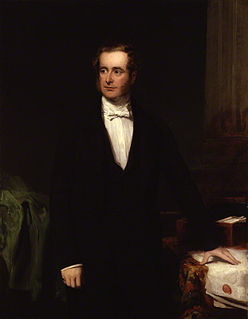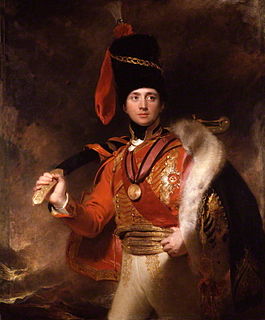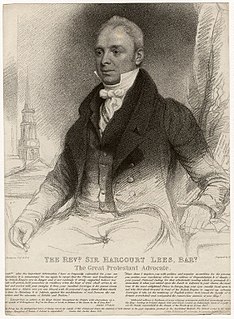Related Research Articles

Thomas Moore was an Irish writer, poet, and lyricist celebrated for his Irish Melodies. Their setting of English-language verse to old Irish tunes marked the transition in popular Irish culture from Irish to English. Politically, Moore was recognised in England as a press, or "squib", writer for the aristocratic Whigs; in Ireland he was accounted a Catholic patriot. Married to a Protestant actress and hailed as "Anacreon Moore" after the classical Greek composer of drinking songs and erotic verse, Moore did not profess religious piety. Yet in the controversies that surrounded Catholic Emancipation Moore was seen to defend the tradition of the Church in Ireland against both evangelising Protestants and uncompromising lay Catholics. Longer prose works reveal more radical sympathies. The Life and Death of Lord Edward Fitzgerald depicts the United Irish leader as a martyr in the cause of democratic reform. Complementing Maria Edgeworth's Castle Rackrent, Memoirs of Captain Rock is a saga, not of Anglo-Irish landowners, but of their exhausted tenants driven to the semi-insurrection of "Whiteboyism". Today, however, Moore is remembered almost alone either for his Irish Melodies or, less generously, for the role he is thought to have played in the loss of the memoirs of his friend Lord Byron.
The Independent Irish Party (IIP) (1852–1858) was the designation chosen by the 48 Members of the United Kingdom Parliament returned from Ireland with the endorsement of the Tenant Right League in the general election of 1852. The League had secured their promise to offer an independent opposition to the dominant landlord interest, and to advance an agrarian reform programme popularly summarised as the "three F's": fair rent, fixed tenure and free sale.

James Robert Hope-Scott was a British barrister and Tractarian.

Richard Chenevix Trench was an Anglican archbishop and poet.

Samuel Wilberforce, FRS was an English bishop in the Church of England, and the third son of William Wilberforce. Known as "Soapy Sam", Wilberforce was one of the greatest public speakers of his day. He is now best remembered for his opposition to Charles Darwin's theory of evolution at a debate in 1860.

Francis Patrick Kenrick was an Irish-born prelate of the Roman Catholic Church who served as the third Bishop of the Diocese of Philadelphia (1842–1851) and the sixth Archbishop of the Archdiocese of Baltimore (1851–1863).

Henry Pelham Fiennes Pelham-Clinton, 5th Duke of Newcastle-under-Lyne,, styled Earl of Lincoln before 1851, was a British politician.

Charles William Vane, 3rd Marquess of Londonderry,, was an Irish soldier in the British army, a politician, and a nobleman. As a soldier he fought in the French Revolutionary Wars, in the suppression of the Irish Rebellion of 1798, and in the Napoleonic wars. He excelled as a cavalry commander on the Iberian Peninsula under John Moore and Arthur Wellesley.

George Henry Moore was an Irish politician, co-founder in the 1850s of the Tenant Right League, of the Catholic Defence Association and, as the Member for Mayo in the United Kingdom Parliament, of the Independent Irish Party. Although an advocate of tenant rights, and renowned for his relief efforts during the Great Famine, at the time of his death in 1870 Moore was defending his rights as a landowner against an oath-bound tenant society, the Ribbonmen.

Henry William Wilberforce, was a Church of England clergyman, a Tractarian, a convert to the Roman Catholic Church, and thereafter a newspaper proprietor, editor and journalist
Robert Isaac Wilberforce was an English clergyman and writer.

The Reverend Sir Harcourt Lees was an Irish clergyman and political pamphleteer on behalf of Protestant Ascendancy in Ireland. He is best known for his strongly worded pamphlets attacking Roman Catholicism.
The Tenant Right League was a federation of local societies formed in Ireland in the wake of the Great Famine to check the power of landlords and advance the rights of tenant farmers. An initiative of northern unionists and southern nationalists, it articulated a common programme of agrarian reform. In the wake of the League's success in helping return 48 pledged MPs to the Westminster Parliament in 1852, the promised unity of "North and South" dissolved. An attempt was made to revive the all-Ireland effort in 1874, but struggle for rights to the land was to continue through to the end of the century on lines that reflected the regional and sectarian division over Ireland's continued place in the United Kingdom.
The Very Rev. George Henry Connor was a Church of England clergyman who became Dean of Windsor.

Daniel Murray was a Roman Catholic Archbishop of Dublin.

The Cambrian Archaeological Association was founded in 1846 to examine, preserve and illustrate the ancient monuments and remains of the history, language, manners, customs, arts and industries of Wales and the Welsh Marches and to educate the public in such matters. The association's activities include sponsoring lectures, field visits, and study tours; as well as publishing its journal, Archaeologia Cambrensis, and monographs. It also provides grants to support research and publications.
John Kirk D.D. (1760–1851) was an English Roman Catholic priest and antiquary.

Charles Smith Bird (1795–1862) was an English academic, cleric and tutor, known as a theological author and writer of devotional verse, and described as a High Church Evangelical. He was the author of several significant books against Tractarianism.
Thomas Heywood (1797–1866) was an English antiquarian. He was closely involved in the Chetham Society and its publications.
William Henry Krause, (1796-1852) was a Church of Ireland priest and noted preacher.
References
- ↑ The Manchester Guardian, IRELAND, 22 October 1851